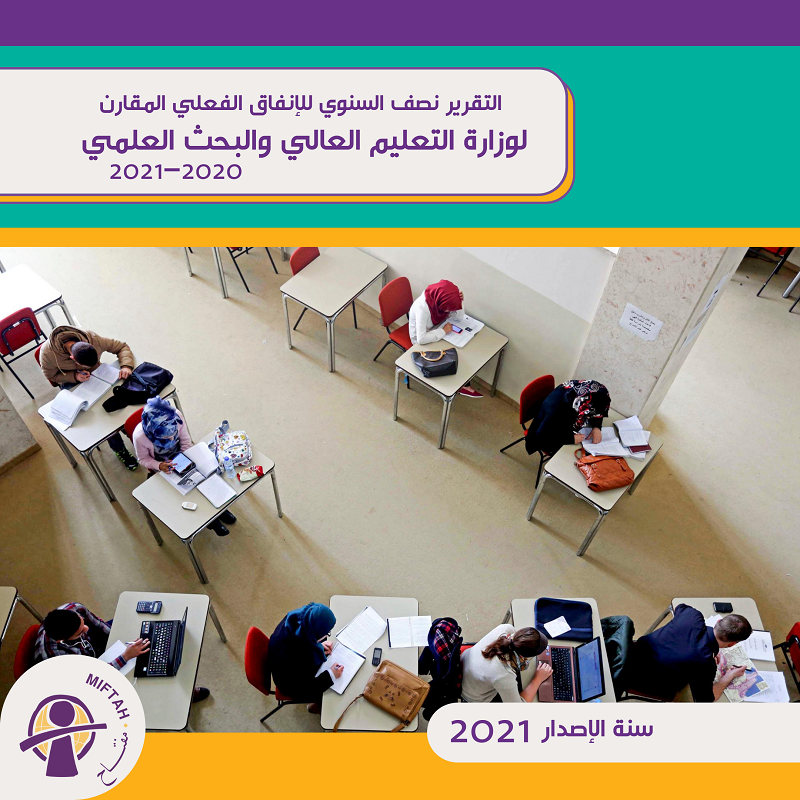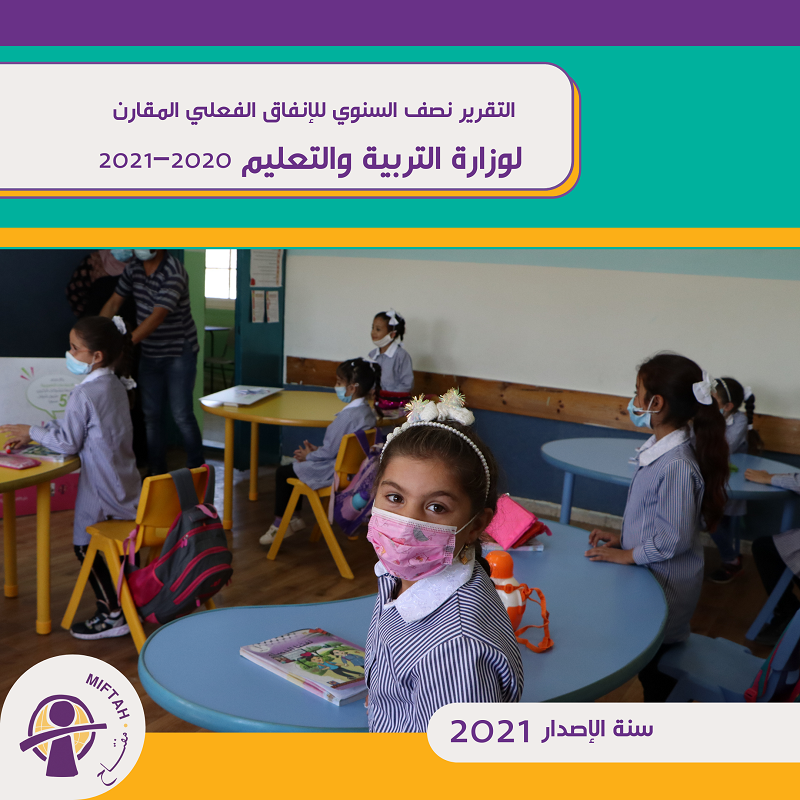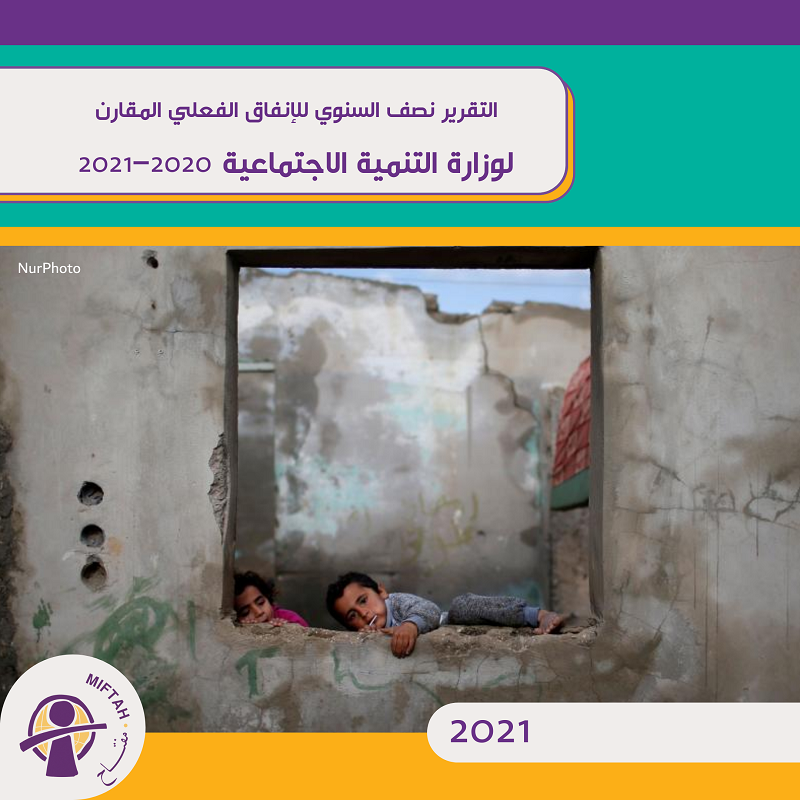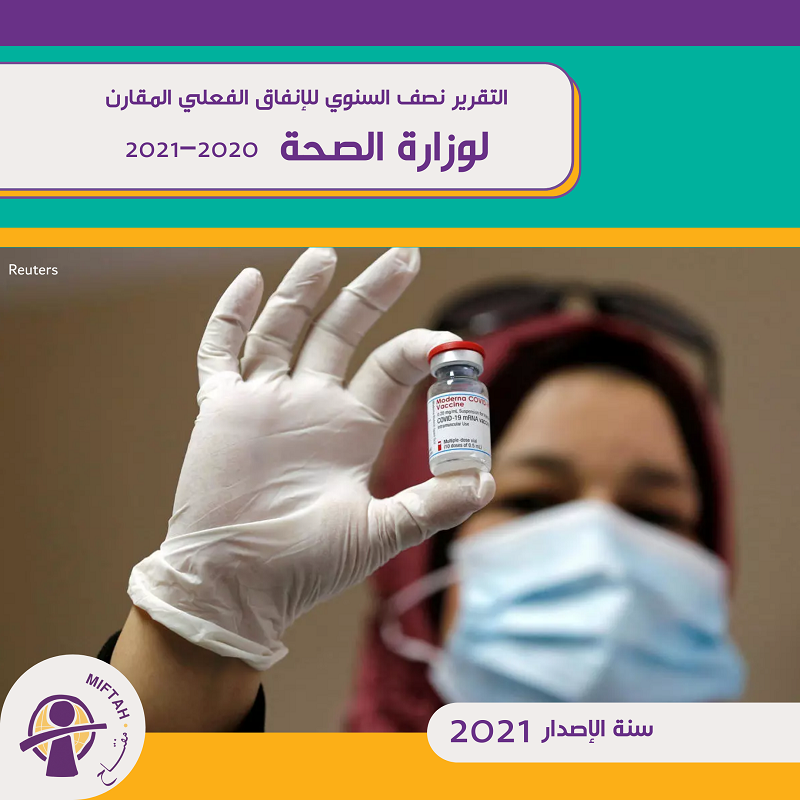|
MIFTAH publishes 2020-2021 biannual reports on comparative actual spending for several social sector ministries
Ramallah – 30/8/2021 – MIFTAH recently published a number of 2020-2021 biannual reports on comparative actual spending for the following social sector ministries: Higher Education and Scientific Research, Social Development and Health. This is part of MIFTAH’s efforts to promote the transparency and openness of service-oriented ministries to the public and to shed light on spending gaps and public fiscal policies in order to promote dialogue between experts in public affairs and in civil society institutions in addition to addressing the gaps in actual spending in the social sector.
Ministry of Higher Education and Scientific Research
According to the 2021 biannual actual spending report released by the Ministry of Finance, the actual spending of the Ministry of Higher Education and Scientific Research was ILS (82.04) million of a total of ILS (7,491.4) million actual biannual spending of the 2021 general budget, or 1.1% of overall expenditures.
Meanwhile, the remittance expenditures, which include university allocations, decreased to ILS (7.22) million in mid-2020 and to ILS (5.60) by mid-2021.
The actual spending of the Ministry of Education was ILS (1,559.4) million of a total of ILS (7,491.4) million in the actual biannual spending of the 2021 general budget, or 20.8% of overall expenditures.
As for the actual spending on salaries, wages and social contributions, “which represents the government’s contribution in the General Authority for Insurance and Pensions” the lion’s share of actual spending was by the Ministry of Education, with the two items comprising a combined 88.6% of the Ministry’s actual spending in the first half of 2021 and 88.2% in 2020. This is attributed to the number of people working in the Ministry of Education (teachers and administrators). Meanwhile, spending on salaries and wages and, automatically, on social contributions increased, after grade and supervisory bonuses for employees were retroactively implemented at the beginning of 2021, as did spending on operational expenses in 2021 from 2020 after the ministry, directorates and schools returned to regular schedules after coronavirus restrictions were eased. Ministry of Social Development
Actual spending on remittance expenses, which is the most important and biggest item in the Ministry of Social Development’s budget and which includes the cash payments for poor families, dropped in the first half of 2021 in comparison to the first half of 2020. It decreased from ILS (466.7) million in mid-2020 to ILS (461.4) million by mid-2021.
The cash assistance program still suffers from irregularity in payment installments. Only one installment was disbursed in the first half of 2021 and also in the first half of 2020 even though two payments were supposed to be disbursed. Moreover, the actual spending of remittance expenditures, which includes cash assistance in the first half of 2021, was less than in the first half of 2020.
The actual spending of the Ministry of Health was ILS (1,029.7) of a total of ILS (7,491.4) million actual biannual spending of the 2021 general budget, or 13.7% of overall expenditures. While, in the first half of 2020, it stood at 10.2%, which is a significant increase.
Meanwhile, the actual spending on salaries and wages was elevated in the first half of 2021 in comparison to the first half of 2020, which can be mainly attributed to the salary increase of medical staff in 2021. The actual spending on goods and services hit the maximum increase by mid-2021 in comparison with mid-2020, with actual expenditures increasing from ILS (254.7) million in the first half of 2020 to ILS (544.9) million by mid-2021. This item includes: medical referrals, the purchase of medicines and vaccines and contract employees in addition to the MoH running costs. On his part, MIFTAH project manager Hassan Mahareeq, maintained that the publication of the reports is aimed at disseminating principles of transparency and integrity and promoting openness for the public in following up on spending policies and the preparation of general budgets, along with applying the principle of oversight on government spending policies. He said such an approach had a shared value all parties seek to achieve towards real partnership and social integration that includes citizens’ participation and monitoring of public affairs, including fiscal policies. It is also aimed at promoting the principles of good governance represented by integrity, transparency and social accountability, he said.
http://www.miftah.org |



